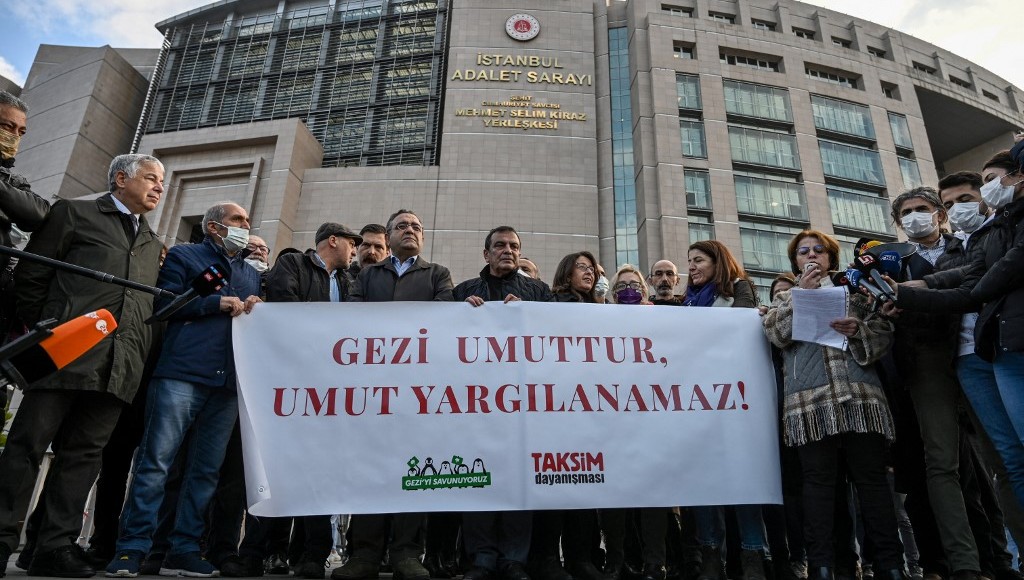In 2013, peaceful protests began in May in İstanbul’s central Taksim Square against plans to redevelop a part of the iconic site but spiraled into weeks of anti-government protests after a police crackdown.
On May Day this year, as every year since then, the venue will be empty after a Turkish court handed prominent civil society leader Osman Kavala a life sentence for allegedly financing that rally and trying to topple President Recep Tayyip Erdoğan’s government.
Taksim, a usually bustling square lined with cafes and hotels, used to be a traditional venue for May Day gatherings and anti-government protests.
Critics accuse Erdoğan of amassing great power, trampling on human rights and quashing dissent.
But despite this backdrop, Monday’s brutal verdict that condemned Kavala to life in prison stunned Turkish civil society and sent shockwaves around the world.
It comes ahead of a presidential election due in June of next year.
“The message is: ‘Don’t move!’,” said Bayram Balci, director of the French Institute for Anatolian Studies (Ifea) in Istanbul.
In his office near Taksim, Akif Burak Atlar, a spokesman for the Taksim Solidarity platform, said he was “shocked” by the verdict.
The İstanbul court also handed down 18-year prison terms to seven other defendants, including architects, urban planners, a film producer and academics.
‘There’s no crime’
“There’s no crime, nor evidence. They were acquitted in two previous trials. As for Osman Kavala, I saw him for the first time in court in 2018,” Atlar said.
The 64-year-old businessman and philanthropist was found guilty of “attempting to topple the government” of Erdogan, who was prime minister in 2013.
Already jailed for more than four years, the Paris-born Kavala denounced the “judicial assassination” minutes ahead of the verdict.
“These are conspiracy theories drafted on political and ideological grounds,” Kavala told the court.
“If they had a rope, they’d have hanged me”, he reportedly told an opposition lawmaker who visited him in jail.
Some of the seven other defendants were “people concerned about preserving their city and nature”, Atlar said.
‘People are scared!’
In a country where protests are quashed, several hundreds of people gathered on Tuesday evening in Istanbul, Ankara and Izmir despite the danger of repercussions.
“People are afraid. No one will take the risk of calling demonstrations for fear of giving a pretext to declare a state of emergency. Erdoğan would be only too happy about it,” political scientist Ahmet İnsel said.
“This verdict is a threat addressed to all journalists, lawyers, rights defenders, NGOs and professionals like us,” Atlar added.
On Friday, Germany summoned Turkey’s ambassador in Berlin over Kavala’s sentencing.
The Kavala affair had sparked a diplomatic crisis last fall: 10 Western ambassadors had been threatened with expulsion for having demanded “a fair and equitable trial.”
Turkey’s mediating role between Russia and Ukraine to try and end the conflict saw Erdoğan return to favor on the global stage, and friends and lawyers of the accused in the Kavala case had hoped for clemency. But that was not to be.
Kavala was only one of tens of thousands of Turks who were either jailed or fired from their jobs in purges that followed a bloody coup attempt against Erdoğan when he was already president in 2016.
The seemingly arbitrary nature of the alternating charges filed against Kavala made him a symbol for rights groups — as well as Western governments — of Erdoğan’s increasing authoritarian streak in the second decade of his rule.
Kavala was charged with plotting a failed coup in 2016 — seen by some analysts as the genesis of Erdoğan’s more authoritarian posture in the latter half of his 20-year rule as well as the 2013 unrest.
© Agence France-Presse

